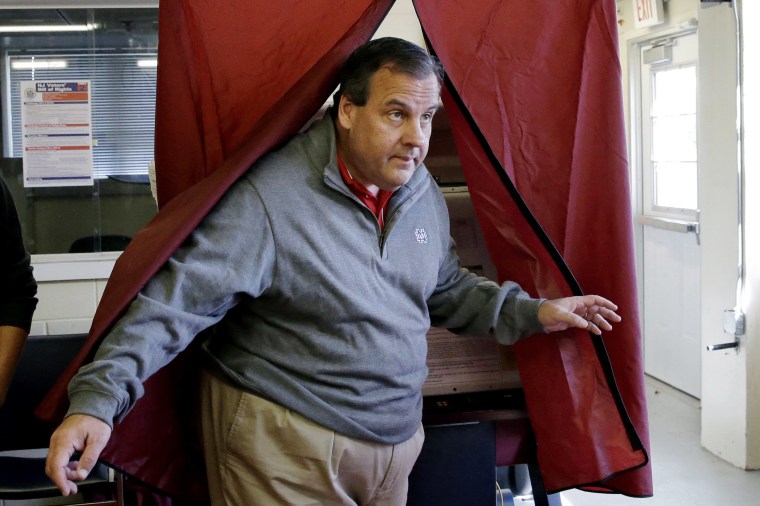About three weeks ago, New Jersey Gov. Chris Christie (R) unveiled a new policy, one whole day in the making, imposing a mandatory, 21-day quarantine on those who may have been in contact with Ebola patients in West Africa. It was this policy of course, that put nurse Kaci Hickox in a tent for a few days.
At the time, Christie seemed quite impressed with himself. Two days after the imposition of the policy, the governor boasted that he had "absolutely ... no second thoughts" about it. Christie was not only certain that his policy would quickly become the national model, when asked about criticisms from CDC specialists, the governor proclaimed, "[T]hey don't want to admit that we're right and they're wrong."
After Christie finally let Hickox leave, the governor added, "Our policy hasn't changed and our policy will not change."
With all of this in mind, Josh Marshall asks a good question: "Did Chris Christie quietly dump his crackpot Ebola quarantine policy when no one was looking?"
We hadn't seen any public reports about new health care workers being forced into quarantines. So we checked in with the state of New Jersey. A spokesperson for the state Health Department told [TPM] that 71 people are currently under active monitoring in the state -- which means they're asked to check their temperature twice a day and report it to the local health department. During the 21 day self-monitoring period they are free to work and go about their business like anyone else. In other words, aside from taking your temperature that's the same situation the doctor in New York had before he started showing symptoms. And it was his case that led to the new policy.
It's important to note that there are some missing pieces to this puzzle, and it's tough to say for certain whether the Christie policy -- the one he was so eager to brag about, the one he used to present himself as a national leader -- was quietly cast aside.
But there seems to be a story here.
We don't know, for example, how many of the 71 people under active monitoring volunteered to help patients in West Africa. But if some did exactly that, as seems likely, then the Christie policy that wouldn't change has already changed quite a bit.
Just to be clear, what I'm suggesting here is that there's a question that deserves an answer. I can't say with 100% confidence that Christie's Ebola policy is different, but it certainly seems different. Perhaps the governor's office should explain to the public the state of the administration's position and the degree to which it's evolved over the last three weeks.
What's more, this isn't just about picking on the Garden State Republican -- given the intensity of public interest in Ebola in October, I think a variety of politicians should be subjected to some accountability.
* Sen. Rand Paul (R-Ky.) publicly raised conspiracy theories about Ebola and the federal government. At a time of national crisis, the senator spouted nonsense, which looked ridiculous at the time, and seems even worse three weeks later. Maybe the Kentucky Republican should explain why he failed this leadership test so completely?
* Rep. Peter King (R-N.Y.) suggested the public should no longer trust public-health officials, and said this may be "a mutated form" of the Ebola virus that's airborne. Maybe the New York Republican can comment now on his mistake?
* Sen.-elect Joni Ernst (R-Iowa) said President Obama hadn't "demonstrated" that he even cares whether or not Americans get Ebola, adding that the total number of Ebola patients in the U.S. was a matter of opinion. Does the right-wing Iowan still believe what she said publicly a few weeks ago?
There was widespread anxiety about the virus a few weeks ago, and while the threat remains real, we now have a better sense of which U.S. leaders were responsible and showed grace under fire, and which U.S. leaders showed poor judgment. Is it outrageous to think the political world can reflect on the difference?
